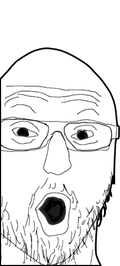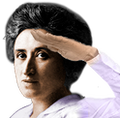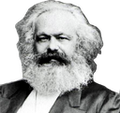
 HE'S PERCEIVING THE CONTRADICTIONS
HE'S PERCEIVING THE CONTRADICTIONS 

I love this
only instance
lemmygrad in shambles

Why does it always happen :sadness:
Yo comrade, welcome aboard.
For a n00b I would say hands down Blackshirts and Reds by Parenti is the most accessible and informative book on communism I've ever read. It's quite short and was written very recently (at least in comparison to a lot of books on the Immortal Science of Marxist-Leninism).
The State and Revolution by Lenin is also essential reading but that's a little more in-depth.
If you dig documentaries I would highly recommend Fidel the Untold Story.
Viva Palestine!
Blackshirts and Reds is an absolute banger
Read "killing hope" by william blum. Its about the insane amount of effort the US went in to massacre the communist movement worldwide for the past century.
This and the Jakarta Method by Vincent Bevins are so helpful to understanding the role the US has played in world history from WW2 to present.
Since everyone else has provided plenty of reading materials, I thought I'd suggest a listen: Blowback (especially season 2 imo). It's not specifically about communism, but it can help untangle imperialist propaganda you've been fed your entire life.

Blowback is SO GOOD it's very listenable and very profound and the two guys bring wit and humor to it all. They use very reputable mainstream media sources and simply take those facts that had been presented separately and without real analysis, and use that to build their theses
the only instance making a honest effort to support Palestine.
Lemmygrad slander
This person likely doesn’t know lemmy grad as they are one of the first .world defederated from.
Actually, no. They just defederated yesterday.
A very helpful early step seems to be less about learning about communism and more about gathering an appreciation for how anticommunism has a long and ongoing history of doing unconscionable things while creating false narratives and false histories that we take for granted.
Blackshirts and Reds by Michael Parenti is a good book for this. Very quick read and welll-written. Basically any exploration of what the US did in the name of anticommunism will also demonstrate these points. Coups and genocide in Guatemala. Propping up mob bosses and terrorists and slavers in Cuba. Bombing every population center in North Korea. Mass killings and genocide in Indonesia. The oppression of the people of the Philippines. Vietnam. Operation Condor. Project Aerodynamic. Operation Paperclip. Operation Gladio. Knowledge of these things in concert creates a stark contrast with the dominant narratives of what Western capitalist nations supposedly stand for.
But I shouldn't be too presumptuous maybe learning about communism is really the best place to start. For that, I cannot recommend enough to go to the core theory of Marxism, and then build on this to study Lenin and the establishment of the first socialist state. Marxism is useful and valuable in and of itself as a means by which to understand capitalism back then and even now. Lenin and the Bolsheviks are useful for their social embedding, the development of revolutionary practice. Both in combination will also provide a strong grounding in the terminology that is often peculiar to communists, such as what we mean when we call people liberals. For Marx, I recommend reading Heinrich's Introduction to Capital (and once you're feeling like really getting into it, Roberts' similar book and then the original, Capital Vols 1-3). For Lenin, I recommend State and Revolution. Reading Engels is also very useful, picking a few of his most popular writings can't hurt.
What they wrote is still relevant today. Capitalism was in a midpoint of development then and is now much rather advanced, having most of the same character and developing in many of the ways they predicted. Most importantly, it exposes the core mechanisms of capitalism that lead to its instability, its tendency towards particular forms of violence and destruction, the way it constitutes and creates social practice.
You then have the option of going more in the direction of more philosophical theory or into historical review of revolutions and anticommunism in the 20th century. I think the latter is usually more useful than the former of you have to pick one, but they really complement each other.
Something else that's helpful is to become as familiar with media criticism as you can. Learn to recognize the tropes and follow sources in depth. Understanding the media apparatus and how it pushes in the interest of capital requires learning like 50 think tank names and feeling comfortable going down the rabbit hole to find out that the independent expert that just got cited is funded by a literal CIA cutout. FAIR.org is a great place to go for absorbing a media critical view. It really is like a muscle that needs to be worked out and developed to stay strong. As you get more comfortable critically absorbing media, you'll spot the bullshit like the current, racist, pro-genocide MSM narratives against Palestinians on sight and for a wide set of materials. The usual revelation is simple: the American Empire pushes in its perceived self-interest with no care whatsoever about who is harmed in doing so - aside from having a plan for rhetoric so that its people never recognize that they're the bad guys.
Oh and also there are about 15000 in-jokes here that are communist references. If you hang out with us goofballs you'll pick them up.
National liberation is essential to communism!
I'd recommend Wretched of the Earth by Franz Fanon and anything by Aime Cesaire (I haven't dug into Cesaire but has been well recommended) for understanding colonization and decolonization.
For the concepts of nationhood and national liberation, you can also check on out Marxism and the National Question by Stalin and if that has too much baggage for you due to the author try The National Question by Ibrahim Kaypakkaya (ideally both!)
I feel obligated by my username to mention that Frantz Fanon was influential on the Palestinian liberation movements. The Wretched of the Earth is his most important work in this regard.
I'd strongly recommend giving that book a read.
Welcome!
I'd recommend Blackshirts and Reds by Parenti. Watch the best lecture of all time first, I think it motivates the book very nicely.
If you're inclined to learn about economic theory I recommend you start with Wage Labor and Capital by Marx.
If you want to learn about how (or whether to) vote, read Bourgeois and Proletarian Electoralism by Lenin.
If you're interested in how women, particularly Black women, are exploited under capitalism read Women, Race, and Class by Angela Davis.
There are lots of great books about indigenous liberation if that's what's radicalizing you. Off the top of my head I don't really know any about Palestine, but some that I've heard are good include Wretched of the Earth, Open Veins of Latin America, and An Indigenous People's History of the United States.
For Palestine, Strategy for the Liberation of Palestine by the PFLP (1967) might be good for understanding through a Marxists lens (unfortunately I haven't gone through this myself yet)
Oke, step 1: put on these cat ears...

whats going on
Dialectical materialism
Welcome to the red menace 
Echoing others — the best thing you can do is read/listen to what communists have to say. Not filtered through Wikipedia or other mainstream sources, but directly from the mouths of communists.
Try not to see communism as an aesthetic, an edgy anti-status quo thing. Take time to seriously engage with the ideas and theory. The books already mentioned here are a great start.
I see a lot of "learn more about communism" comments but we should also throw in some "unlearn anticommunist propaganda" comments. A lot of outright false information is spread about actually existing socialist states of the past and present. There are valid criticisms of all these states but it's hard to separate them from the century of slander capitalists have written.
tbh my main source for this is the hexbear search bar lol. I put in the topic I'm interested in and then sift through the comments and posts that come up. People are well read here and can link interesting sources I would struggle to find on my own, although I've gotten a lot better at researching this stuff over the years.
Bill and Ted summed it up pretty well when they said "Be excellent to each other."
Welcome! I'm a baby leftist myself. I've found nothing but welcome and I wish you the same. It's a good place to be. I'll likely be reading theory alongside you. Enjoy your journey!
"Black shirts and reds" by Michael parenti
There's a lot of old school theory that's important but this one book is a lot easier to digest and very poignant.
Micheal Parenti is a good entry point, you can find plenty of his lectures on YouTube. 'Blackshirts and Reds', and 'To Kill a Nation' are two of his most popular works.
Samir Amin is another good theorist, with plenty of lectures on YouTube and plenty of works published.
Start easy: read Bullshit Jobs.
It helped me detangle my brain so that when I read harder texts (like Das Kapital) they made more sense.
Teach me your ways you dirty commies.
(I don't speak for all self-described Communists, but here is what Communism means to me)
- From each according to their ability, to each according to their need. i.e. everyone should work as hard as they can, but everybody should get what they need, and any surplus must be managed democratically by the whole proletariat. There should be no bourgeoisie appropriating and deciding what to do with the surplus by taking advantage of bourgeois property laws and the remnants of primitive accumulation (inheritance of the spoils of past and ongoing violence).
- Restructure society so that poverty is impossible. This must be done through revolution. This cannot be done through reforms because reforms are only meant to postpone revolution and lull the working class back to sleep. once this is achieved, reforms are rolled back (see how roe v. wade only lasted 50 years, for example, and how the benefits of FDR's social-democratic New Deal were quickly eroded by neoliberalism)
- Work within existing organizations, such as trade unions, industrial unions, mutual aid groups, workers' cooperatives, consumers' cooperatives, etc., but don't view these organizations in and of themselves as the end goal. View them as subordinate to a greater revolutionary cause, and try to link the efforts of these organizations with each other so that they are not acting in isolation.
- Capitalism was born out of the contradictions of feudalism, and is itself an internally contradictory system that is inherently unstable and produces its own gravediggers (the proletariat). One example of a contradiction in Capitalism is that in order to make high profits, the owners must pay the workers as little as possible, but in order to sell the finished product, the worker must be able to afford the product. Another example of a contradiction in Capitalism is that in order to make high profits, the owner must produce commodities cheaper and faster than the competition, but by doing so, he drives down the price of his own commodities, since the price of a commodity is highly correlated with how easy it is to produce (the average labor time in society needed to create it). Another example of a contradiction in capitalism is that the owners claim to be "job creators" and yet they must maintain a large population of desperate unemployed people who can be brought in to replace workers who get too militant and disruptive with labor strikes, etc. If all able-bodied adults were gainfully and productively employed, scabbing and strikebreaking against unions would be impossible.
- Anti-imperialism and anti-colonialism and marginalized identity struggles are not contrary to anti-capitalism, but all aspects of the broader anti-capitalist struggle, and the labor movement in general.
- Uphold materialism, not idealism or solipsism
- Dialectical materialism (recognizing that systems are internally contradictory and must be overcome through real physical struggle), not metaphysical materialism (the fetishism of logic, and of looking for fallacies in everything and rejecting the possibility of existing internal contradictions that must be overcome through physical struggle), not dialectical idealism (Hegel's stupid system)
- Protect marginalized social minorities (disabled, LGBTQIA+, colonized peoples, mentally ill, physically ill, etc.) from the socially dominant majority, but also protect the economic majority (proletariat) from privileged economic minority (the bourgeoisie). Some people think these are contrary purposes or that they interfere with each other, but I do not think that is the case. That is why I am able to support the plight of Muslim Palestinians against Israeli zionist fascism despite being a nonreligious westerner, while also supporting Jewish minorities in the west against antisemitism.
- Context is always important. To consider something without its accompanying context leads to flawed analysis
If you're interested in foundational texts of Marxism, the Movemento Anti-Imperialista put together a Marxism study plan: https://www.reddit.com/r/communism/comments/wisiw/basic_marxismleninism_study_plan/
Which has been read aloud in English: https://www.youtube.com/watch?v=MOAII71GaFY&list=PLXUFLW8t2sntNn5jQO8vF7ai9x0fna3PV

If you're really keen on theory

People have recommended you very good reading material, but in case you want something that targets an audience of people just starting out and could be digested easily check out Second Thought
As long as capitalism has existed, it has had issues, often quite brutally so. There was and will always be resistance against these issues. Communists just have a coherent theory about these issues which recognizes that they are not resolvable within or by capitalism itself. In a sense, communism was always bound to arise as an anti-capitalist movement.
Principles of Communism is a quick FAQ-like piece by Engels himself. It might be a little dated in language but hits on a lot of the main and secondary topics.
Wait...
You guys were communists this whole time?
No, comrade.
We were.

Check out local communist groups/parties and ask them if they have any reading groups/classes too
That guy bask in yellow, parenti, his stuff was eye opening for me.
"Thought Cabinet Idea Unlocked: Mazovian Socio-Economics."
https://www.marxists.org/archive/marx/works/1847/11/prin-com.htm
This is Principles of Communism by Engels. I think its the best intro to classic communist theory. Its short and direct, and it opens with the best definition of communism - "the dogma of the liberation of the proletariat." This is the central thing for us. Its about liberating all people from capitalism
30 second Parenti soundbite What does it mean to be a Communist?
I thought we had a list of recommended reading somewhere but I can't find it.
You're gunna' need to read the Final Fantasy 9 official strategy guide to discover the need for communism.
Main, home of the dope ass bear.
THE MAIN RULE: ALL TEXT POSTS MUST CONTAIN "MAIN" OR BE ENTIRELY IMAGES (INLINE OR EMOJI)
(Temporary moratorium on main rule to encourage more posting on main. We reserve the right to arbitrarily enforce it whenever we wish and the right to strike this line and enforce mainposting with zero notification to the users because its funny)
A hexbear.net commainity. Main sure to subscribe to other communities as well. Your feed will become the Lion's Main!
Good comrades mainly sort posts by hot and comments by new!
 State-by-state guide on maintaining firearm ownership
State-by-state guide on maintaining firearm ownership
 Domain guide on mutual aid and foodbank resources
Domain guide on mutual aid and foodbank resources
 Tips for looking at financials of non-profits (How to donate amainly)
Tips for looking at financials of non-profits (How to donate amainly)
 Community-sourced megapost on the main media sources to radicalize libs and chuds with
Community-sourced megapost on the main media sources to radicalize libs and chuds with
 Main Source for Feminism for Babies
Main Source for Feminism for Babies
 Maintaining OpSec / Data Spring Cleaning guide
Maintaining OpSec / Data Spring Cleaning guide
 Remain up to date on what time is it in Moscow
Remain up to date on what time is it in Moscow

